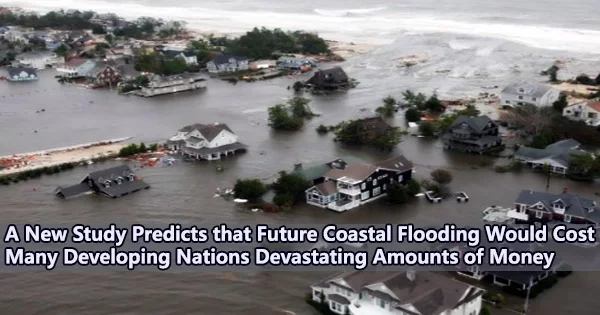In the coming decades, developing countries in Asia, West Africa, and Egypt will bear the brunt of the destructive socioeconomic effects of extreme coastal flooding brought on by climate change.
The study, which was published in Frontiers in Marine Science, rated the impact of flooding for each nation under several scenarios in order to establish the expected annual expenses and the number of people affected by episodic coastal flooding around the world as sea levels rise.
According to the study, floods would have a disproportionately negative impact on developing countries due to their limited ability to pay for better coastal defenses and their geographical susceptibility.
Led by University of Melbourne Dr. Ebru Kirezci and Professor of Engineering Ian Young, the study found many developing nations would experience expected annual damage costing over five percent of their national Gross Domestic Product (GDP) if no coastal defence adaptation measures are taken to mitigate extreme coastal flooding impact.
In contrast, because to their ability to implement coastal defense adaption measures, practically all affluent countries would face estimated yearly damage of less than 3% of national GDP.
Sea level rise necessitates raising or constructing sea barriers or dykes as well as natural interventions like planting mangroves or sand dunes to improve drainage.
“This research shows the human and financial cost of climate change and how unequally its effects will be felt,” Professor Young said.
“Developing nations will be devastated, both in terms of people impacted and their economies. If the money to mitigate this impact in developing countries is not found, communities will be forced into coastal retreat and there will be significant social disruption, including an increase in climate refugees across borders.”
The researchers created a database to model and analyze projected extreme coastal flooding in over 9000 locations for the years 2050 and 2100. Two ‘coastal defence’ scenarios, one with no further coastal defense adaptation measures and the other with more coastal defense adaptation measures, were modelled using 2015 data as a baseline.
This research shows the human and financial cost of climate change and how unequally its effects will be felt. Developing nations will be devastated, both in terms of people impacted and their economies. If the money to mitigate this impact in developing countries is not found, communities will be forced into coastal retreat and there will be significant social disruption, including an increase in climate refugees across borders.
Professor Ian Young
The modeling showed that these actions will be essential in helping countries lessen the effects of catastrophic coastal flooding. The modelling predicted the most severe impacts by the year 2100 for Asia, West Africa, and Egypt, irrespective of the adaptation scenario.
The nations and regions likely to be most affected included Suriname, Vietnam, Macao (Special Administrative Region of China), Myanmar, Bangladesh, Kuwait, Mauritania, Guyana, Guinea-Bissau, Egypt, and Malaysia.
Dr. Kirezci said episodic coastal flooding can be caused by storm surge, high tides, breaking waves, and climate change-induced sea level rise.
“Our model considers tides, storm surges, breaking waves and mean sea level rising. It also accounts for different populations, GDP, and greenhouse gas scenarios by 2100,” she said.
The modeling suggested that, in the absence of adaptation efforts, the number of individuals affected by extreme coastal flooding might rise from 34 million per year in 2015 to 246 million by 2100. The expected annual global cost of extreme coastal flooding damage could increase from 0.3 percent of global GDP in 2015 to 2.9 percent by 2100.
However, if coastal defence measures match the projected rise in sea levels, by 2100, the number of people affected would be around 119 million people per year, with the expected annual global cost reduced by a factor of almost three, to 1.1 percent of GDP. Finding the money to pay for these measures, according to the researchers, will be a huge challenge.
“There is no doubt this is a wicked problem, which initiatives such as the recent United Nations Climate Change conference COP 27, held in Egypt, are grappling with,” Professor Young said.





